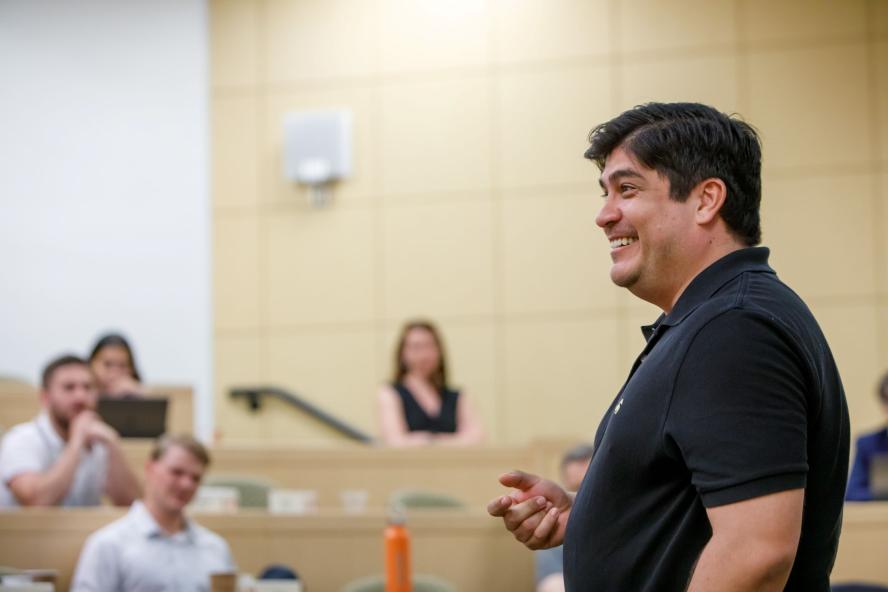-

Hear from Professor Monica Toft
Learn how Professor Monica Toft is shaping the study of global affairs and diplomacy at Fletcher.
Hear from Prof. Toft -

Explore Fletcher academics in action
Fletcher Features offers insights, innovation, stories and expertise by scholars.
Get global insights -
Get application tips right from the source
Learn tips, tricks, and behind-the-scenes insights on applying to Fletcher from our admissions counselors.
Hear from Admissions -

Research that the world is talking about
Stay up to date on the latest research, innovation, and thought leadership from our newsroom.
Stay informed -
Meet Fletcherites and their stories
Get to know our vibrant community through news stories highlighting faculty, students, and alumni.
Meet Fletcherites -

Forge your future after Fletcher
Watch to see how Fletcher prepares global thinkers for success across industries.
See the impact -

Global insights and expertise, on demand.
Need a global affairs expert for a timely and insightful take? Fletcher faculty are available for media inquiries.
Get in Touch
“We were the bicycle on the five-lane highway”
Professor and 48th President of Costa Rica Carlos Alvarado Quesada weighs in on small state leadership in climate policy

Large countries like China, the United States, and India dominate the climate change conversation and are the world’s biggest carbon emitters, but small states are disproportionately vulnerable to the effects of climate change. What's the role of small states in climate change mitigation efforts, and how do we prioritize the unique challenges they face and learn from their innovative solutions?
To learn from the example of Costa Rica, a leader in the field, The Fletcher School and Tufts University's Tisch College hosted an intimate conversation between 48th President of Costa Rica Carlos Alvarado Quesada and Tufts Professor Alnoor Ebrahim. As Professor of Practice of Diplomacy at Fletcher, Alvarado provides invaluable insight into responsible and empathetic leadership in his course, “Leadership in the Public Sphere.” The conversation on February 15 taught community members valuable lessons from Alvarado’s tenure as president.
With a population and GDP smaller than Massachusetts’, Costa Rica “punches above its weight in a number of issues, including climate leadership,” said Elbrahim in his introduction.
“We often don’t talk about political, global governance and nature together,” he added, “but the former president brings them together. Here’s a small state taking action on the global stage; how does a small state do this sort of thing?”
During his tenure as president, Alvarado was lauded for his climate leadership. In 2022, he received the National Geographic Society’s Planetary Leadership Award for his commitment to protecting the ocean, and in 2019 he was awarded on behalf of Costa Rica the Champion on the Earth Award for policy leadership. He was included in TIME100 Next 2019’s list of emerging leaders shaping the world.
“Small can impact scale,” said Alvarado. “I believe it has a lot to do with the power of example, the power of narrative, and that being a driver for good change to happen. We tried to build on the legacy before us to keep pursuing a policy of leading by example. That has been the story of Costa Rica.”
Alvarado cited three cases in which Costa Rica has implemented change that resonated across the world. The country abolished its army in 1949, investing instead in healthcare, education, and conservation. In 1941, the country adopted a universal healthcare system, well before the United Kingdom adopted a similar policy. And for a country that’s composed of more water than land, and in possession of six percent of the world’s biodiversity, the country made massive efforts to recover and preserve biodiversity after a drastic loss over the last century.
Alvarado recently received one of the best gifts, he said, when he saw a story in the Los Angeles Times noting that California was citing Costa Rica’s decarbonization plan in their own efforts towards climate action.
“We were the bicycle on the five-lane highway,” said Alvarado. Not only was Costa Rica’s plan good for its sustainability targets, but it was also profitable for the country. Now, it’s influencing the world’s fourth biggest economy.
Bold leadership that’s policy-forward has been a through line of Alvarado’s work. To effectively govern, he had to form a coalition government within the country’s parliament; politicians coalesced around issues and policy instead of political parties. Costa Rica has used its climate leadership to co-chair the High Ambition Coalition for Nature and People. While in 2019 the coalition’s 30x30 proposal—to protect 30 percent of the world’s ocean and land by 2030—seemed an impossible goal, Costa Rica was able to leverage its credibility with allies and invite them along. In December 2022, the proposal was adopted by 196 countries at the UN Biodiversity Conference in Montreal.
Underneath everything, Alvarado cites humble and empathetic leadership as a cornerstone of effecting policy change.
“It’s so powerful, this romanticized notion we have of leadership. We have this picture of it—a statue, Napoleon, the white man on the horse. That’s the narrative we carry,” said Alvarado, “but when you start going deeper, you see the barriers there are around leadership.”
Polarization and the proliferation of hatred on social media are some of the biggest challenges to leadership, Alvarado said. He diagnoses that the contemporary political trend is to align with one of the currents of that polarization. Alvarado sees that courageous leadership comes from renouncing power and showing the way. Leaders should be empathetic and humble, accepting when they’re wrong or don’t have all the answers.
“There’s a lot of ‘us and them’ going on right now. I’m never driven to polarization. Polarization is one of the most dangerous games,” he said. “I do believe there’s a power in empathy, not for power itself but a larger end, which has to do with reaching out to the other.”

